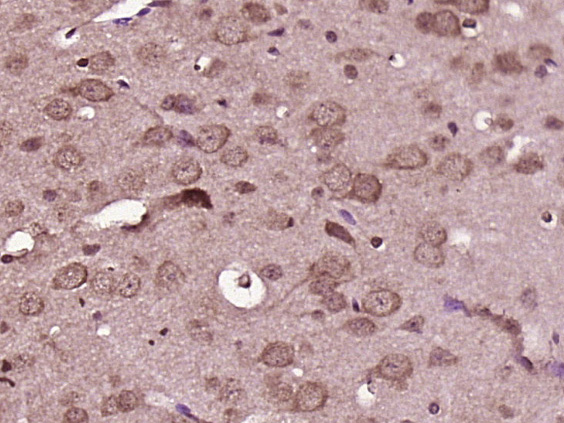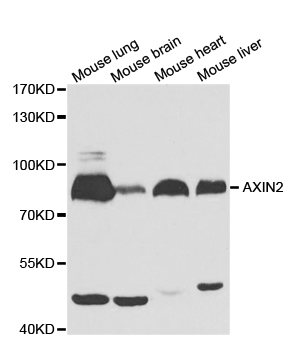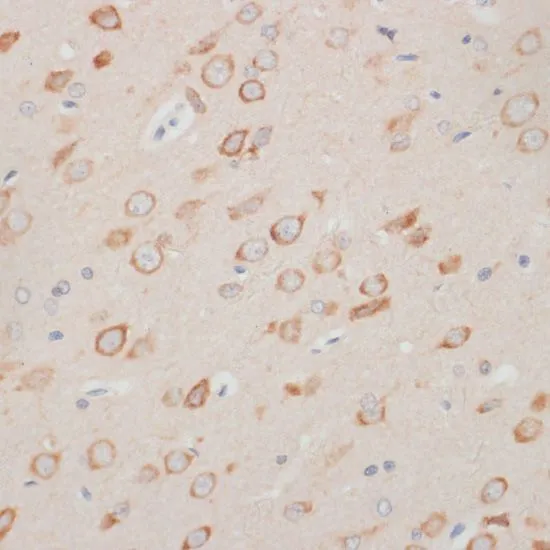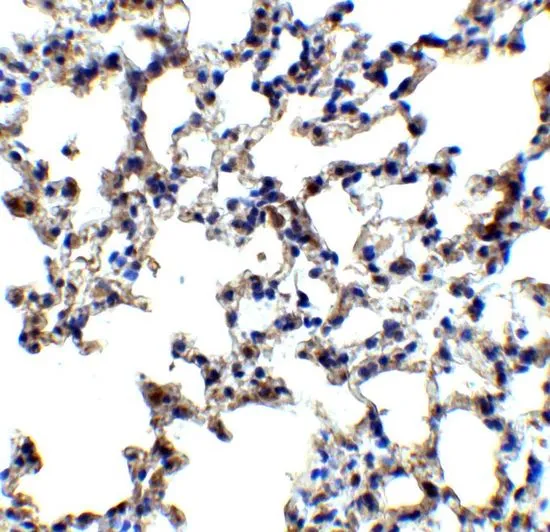![axin 2 antibody [N2C2], Internal detects axin 2 protein at cytoplasm in rat brain by immunohistochemical analysis. Sample: Paraffin-embedded rat brain. axin 2 antibody [N2C2], Internal (GTX105442) diluted at 1:500.
Antigen Retrieval: Citrate buffer, pH 6.0, 15 min axin 2 antibody [N2C2], Internal detects axin 2 protein at cytoplasm in rat brain by immunohistochemical analysis. Sample: Paraffin-embedded rat brain. axin 2 antibody [N2C2], Internal (GTX105442) diluted at 1:500.
Antigen Retrieval: Citrate buffer, pH 6.0, 15 min](https://www.genetex.com/upload/website/prouct_img/normal/GTX105442/GTX105442_41066_20160809_IHC-P_R_w_23060120_910.webp)
axin 2 antibody [N2C2], Internal detects axin 2 protein at cytoplasm in rat brain by immunohistochemical analysis. Sample: Paraffin-embedded rat brain. axin 2 antibody [N2C2], Internal (GTX105442) diluted at 1:500.
Antigen Retrieval: Citrate buffer, pH 6.0, 15 min
Axin 2 antibody [N2C2], Internal
GTX105442
ApplicationsWestern Blot, ImmunoHistoChemistry, ImmunoHistoChemistry Paraffin
Product group Antibodies
ReactivityHuman, Mouse, Rat
TargetAXIN2
Overview
- SupplierGeneTex
- Product NameAxin 2 antibody [N2C2], Internal
- Delivery Days Customer9
- Application Supplier NoteIHC-P: 1:100-1:1000. *Optimal dilutions/concentrations should be determined by the researcher.Not tested in other applications.
- ApplicationsWestern Blot, ImmunoHistoChemistry, ImmunoHistoChemistry Paraffin
- CertificationResearch Use Only
- ClonalityPolyclonal
- Concentration1 mg/ml
- ConjugateUnconjugated
- Gene ID8313
- Target nameAXIN2
- Target descriptionaxin 2
- Target synonymsAXIL, ODCRCS, axin-2, axin-like protein, axis inhibition protein 2, conductin
- HostRabbit
- IsotypeIgG
- Protein IDQ9Y2T1
- Protein NameAxin-2
- Scientific DescriptionThe Axin-related protein, Axin2, presumably plays an important role in the regulation of the stability of beta-catenin in the Wnt signaling pathway, like its rodent homologs, mouse conductin/rat axil. In mouse, conductin organizes a multiprotein complex of APC (adenomatous polyposis of the colon), beta-catenin, glycogen synthase kinase 3-beta, and conductin, which leads to the degradation of beta-catenin. Apparently, the deregulation of beta-catenin is an important event in the genesis of a number of malignancies. The AXIN2 gene has been mapped to 17q23-q24, a region that shows frequent loss of heterozygosity in breast cancer, neuroblastoma, and other tumors. Mutations in this gene have been associated with colorectal cancer with defective mismatch repair. [provided by RefSeq, Jul 2008]
- ReactivityHuman, Mouse, Rat
- Storage Instruction-20°C or -80°C,2°C to 8°C
- UNSPSC12352203
References
- Hsu TH, Jiang SY, Chang WL, et al. Involvement of RARRES3 in the regulation of Wnt proteins acylation and signaling activities in human breast cancer cells. Cell Death Differ. 2015,22(5):801-14. doi: 10.1038/cdd.2014.175Read this paper

![Whole cell extract (30 μg) was separated by 7.5% SDS-PAGE, and the membrane was blotted with Axin 2 antibody [N2C2], Internal (GTX105442) diluted at 1:500. The HRP-conjugated anti-rabbit IgG antibody (GTX213110-01) was used to detect the primary antibody, and the signal was developed with Trident ECL plus-Enhanced. Whole cell extract (30 μg) was separated by 7.5% SDS-PAGE, and the membrane was blotted with Axin 2 antibody [N2C2], Internal (GTX105442) diluted at 1:500. The HRP-conjugated anti-rabbit IgG antibody (GTX213110-01) was used to detect the primary antibody, and the signal was developed with Trident ECL plus-Enhanced.](https://www.genetex.com/upload/website/prouct_img/normal/GTX105442/GTX105442_41066_20200515_WB_w_23060120_943.webp)
![axin 2 antibody [N2C2], Internal detects axin 2 protein at cytosol on mouse hind brain by immunohistochemical analysis. Sample: Paraffin-embedded mouse hind brain. axin 2 antibody [N2C2], Internal (GTX105442) dilution: 1:500.
Antigen Retrieval: Trilogy? (EDTA based, pH 8.0) buffer, 15min axin 2 antibody [N2C2], Internal detects axin 2 protein at cytosol on mouse hind brain by immunohistochemical analysis. Sample: Paraffin-embedded mouse hind brain. axin 2 antibody [N2C2], Internal (GTX105442) dilution: 1:500.
Antigen Retrieval: Trilogy? (EDTA based, pH 8.0) buffer, 15min](https://www.genetex.com/upload/website/prouct_img/normal/GTX105442/GTX105442_41066_IHC_M_w_23060120_203.webp)






